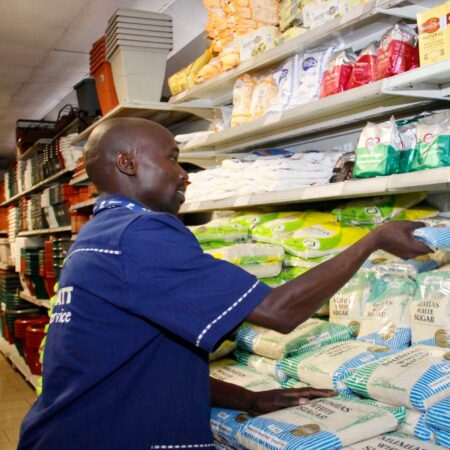This article aims to highlight the challenges and implications of COVID-19 in the agricultural sector using current industry trends and outcomes to forecast the impact of the pandemic on agricultural value chains and consumer behaviour in the short, medium and long term. Most importantly, however, this report proffers actionable innovations and systems that can be adopted and scaled up to negate the effects of the pandemic on food supplies to urban areas and industrial processors in Nigeria.
WHERE WE ARE NOW:
Short term (1-3months)
- Disruption of supply chains due to inter and intrastate border closures. An example being the pileup of trucks on the Kano-Kaduna road due to shutdowns on what is a key route for national grain distribution.
- The stock of grains does not seem to be hampered but there is a risk it will if the current situation persists for a period longer than 3-4 months. The federal government has already pulled on 70,000mt from the strategic grain reserve in response to the pandemic’s effects1 which is unsustainable, to say the least.
- Key cash crops such as cocoa, ginger and perishables like tubers and vegetables are most vulnerable to the restrictive effects of COVID-19.
- Restrictions have impacted consumer behaviour, especially in spending habits with less market activity and an increase in home delivery.
- Farmers might not be able to maximize their productivity and yields due to a shortfall in labour and movement restrictions, or plain old fear.
- There has been a marked increase in the cost of agricultural inputs such as herbicides and insecticides due to trade and import limitations.
Medium–term (3-6months)
- Supply chains of both grains and perishables will be hampered and have to be restructured to meet domestic demand.
- A decline in financial activities will negatively affect the spending power of consumers.
- Government incentives such as agricultural credit, extension, input subsidization, and value-added incentives, which had hitherto recorded relative success, will be impacted by a lack of funding and mobility to reach their targets.
- Increased pressure for food might lead to security challenges on agricultural assets.
Long term (6-12months and beyond)
- Rural supply chains devoid of funding and other incentives might not be able to cater to both industrial and domestic consumption with a real danger of supply shortfall putting a lot of urban dwellers in danger of food insecurity.
- There might be a reversal of rural-urban migration with lower income earners heading back to rural areas to meet their daily needs. While not necessarily disadvantageous to agricultural production, the shortfall in low–level services might increase the cost of living in urban areas and a rethink of supply chain dynamics might have to be implemented.
- Lower yields of staples such as rice, corn, sorghum, soy, and so forth, due to a decrease in planting.
- The government might be forced to reverse its border closure for essential goods.
Also Read: Commercial bee farming could be Africa’s food security key
CHALLENGES:
- Logistics: Movement of agricultural produce from predominantly rural farms to urban consumers and peri–urban processors are already negatively impacted. This is accompanied by a noticeable increase in cost and time of delivery, the risk to perishable goods and reluctance of drivers to enter COVID-19 hotspots.
- Farmer Apprehension: The restrictions on movement will hurt farmers especially with the impending planting season. While there are incentives such as the planned designation of farming as an essential service, the psychological effects of fear of contagion might still prove a barrier and hamper expected yields.
- Purchasing Power of consumers: Even at the best of times, it is estimated that 69% of Nigerians struggle daily to put food. With the triple effects of the pandemic, oil price decline and inflation (currently 12.20%)3 due to fiscal and monetary limitations, there is a great danger that with a persistent epidemic, consumers might have very little purchasing power putting an already vulnerable, undernourished and malnourished population in real danger of starvation.
- Security: Before the COVID-19 outbreak, one of the most inherent challenges faced by the agricultural sector was the security of agricultural assets which negatively affected investment in the sector with frequent farmer-herder clashes, terrorism, and banditry making access to huge swathes of arable land inaccessible. The increased pressure due to restrictions on movement will put more pressure on agricultural production; securing agricultural installations and investments is a challenge that has to be urgently addressed.
OPPORTUNITIES: A TIME TO INNOVATE.
While the pandemic by all human standards and ramifications is a catastrophe especially with the loss of lives and sudden change in socio-economic practices, like any other crisis in human existence, it provides us with new opportunities to innovate and make positive alterations to how we were operating before.
In Nigeria, this might finally be the chance to accelerate our agricultural revolution as consumer focus moves from luxury goods to essentials like food and water. The agricultural sector had witnessed some decent strides in the right direction with laudable government incentives such as credit funding, import tariffs/bans, import waivers on agricultural inputs, Presidential Fertilizer Initiative (PFI), Agricultural Promotion Policy (APP) and private sector participation (AFEX, Farmcrowdy, dairy industry investments, rice producers, etc.). However, there has been a reluctance to depart from the norm especially with consumer preference; as observed with the low acceptance of locally produced rice, the outrageous prices of imported substitutes notwithstanding.
The aftermath of the pandemic thus presents a unique opportunity for all industry players to adopt local innovative solutions to the underlying problems plaguing the industry as well as tap into the gaps created, especially in urban markets. Some of the areas viable for such interventions include but are not limited to:
- E-Commerce: The risk of contagion has already impacted consumer behaviour with more people open to the idea of carrying out transactions online than ever before. This is a great opportunity for farmers, retailers and suppliers to tap into e-commerce and mobile payments to meet increasing consumer demand.
- Mobile markets/Dispatch: There exists an opportunity to tap into mobile markets which could be trucks that move from different locations within cities on specific dates to deliver available products to consumers. This will be very helpful for lower–income earners who might not be able to afford e–commerce services.
There is also a marked opportunity for dispatch services for small quantities of goods delivered to households in hard to reach areas.
- Logistical partnerships: As a friend once said: “have you noticed there is a Coca Cola in every hamlet in Nigeria no matter the situation on the ground?” With the cost in time and resources for moving goods expected to markedly increase if the pandemic persists, there is a huge opportunity for logistical partnerships between agricultural companies and established brands like Coca Cola to move goods in mostly empty returning trucks to bridge logistical gaps.
Also Read: Agribusiness digitization to boost food production in Tanzania
Another way to assuage logistical challenges may be in using an “UBER” model for truck hire using a centralized hotline of logistic companies to hail nearby available trucks to avert backlog of goods.
The logistical challenges will, however, be ideally assuaged if and when the government can provide rail services across the country in the long term.
- Effective Cold Chain systems: Cold chains are an effective way to manage supply disruptions especially for perishables such as meat, dairy and vegetables. Situating large scale cold chain systems in urban areas can provide a buffer to the shocks of supply shortfalls. This presents a significant opportunity for private sector participation in the identified value chains.
- SMART farming: Smart farming is the leveraging of advanced technology for tracking, monitoring and analyzing farm operations4. With an anticipated and advised decrease in human day–to–day interaction, the pandemic presents an opportunity for implementation of such technologies as drone technology for mapping and monitoring; and farmer databases which will reduce the need for human interaction in extension, credit vetting, and input distribution, just to mention a few.
- Urban Farming: With anticipated pressures on rural production sources, the most sustainable means of feeding our cities, in the long run, is the use of urban farming techniques. Urban farming is the use of urban spaces leveraging on innovative technology to maximize output with very limited land resources. Some of these methods include hydroponics, vertical farming, urban greenhouses, rooftop gardens, and other such resources.
These techniques are easily applicable and easy to scale up, as they use public spaces, containers, rooftops, abandoned buildings and even backyards for production and are already practiced by many forward-looking cities.
A great reference case for urban farming is Fresh Direct5, an Abuja based business that produces fresh vegetables on a commercial scale from containers using vertical farming techniques. This can be exploited by the government as part of an urban policy or by private sector players.
- Agricultural Assets Security: One of the impacts should we have a prolonged shutdown might be the security strain on agricultural assets across an already volatile country. With increased desperation for food items in a worst-case scenario there might be a hike in robberies and attacks on farms, storage facilities, trucks, and warehouses.
A unique opportunity might arise out of this in the provision of agricultural asset–specific private security, considering that it will be impossible for the government to secure all assets nationwide. This could be a very lucrative venture if properly harnessed.
- Agrochemicals Production: With global production and supply chains hampered by the pandemic, key inputs such as agrochemicals which have been traditionally imported from Asia and Europe are already adversely affected. This provides an opportunity for local manufacturers to bridge the supply deficit ensuring that key agricultural inputs such as herbicides, pesticides, and fertilizer, will have more robust domestic value chains.
- Standardization of Local Consumables: Nigerians have over the years shown a great appetite for consumption of imported goods. While this can be attributed to various underlying factors, it will not be remiss to say the standard of local alternatives plays a huge role in shaping this trend. While it is true that the cost of local production has hampered the competitiveness of home-made goods, the impact of the pandemic offers a huge opportunity due to the already manifesting consumer behaviour shift to bridge the gap. With border closures, fear of contamination from foreign goods (especially from China), and less import activity, there is a gap to fill for most consumables which foresighted domestic producers should be exploring. The catch, however, is that they will have to improve on their standards to penetrate a market that is used to luxury consumption, which in turn will improve the general standard of Nigerian made produce and could even see the country become an active player in the export of consumables on the African continent.
CONCLUSION:
While taking into full consideration the devastating effects of the pandemic on lives and socio-economic wellbeing in the short, medium and long term there are various opportunities a prolonged shutdown might portend for the agricultural sector. This is a time to identify value chain gaps, develop more robust local solutions, and embrace the application of sustainable systems to harness domestic agricultural potential. A sector that was crying out for acceptance and implementation of innovation on all fronts might have just found an unlikely accelerator in the COVID–19 virus.










